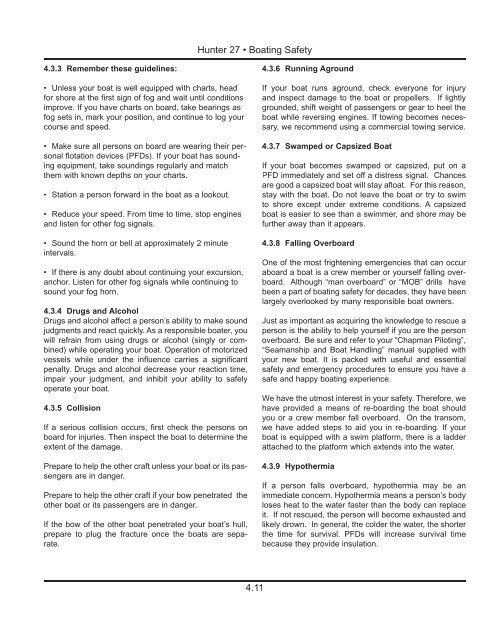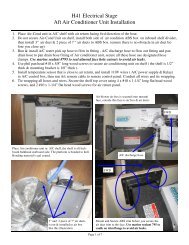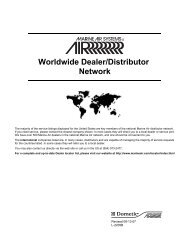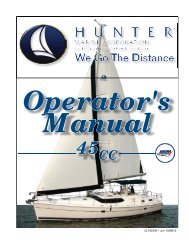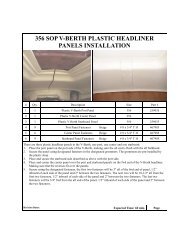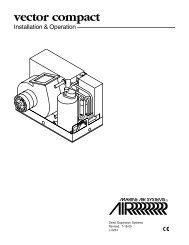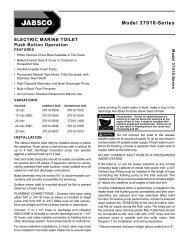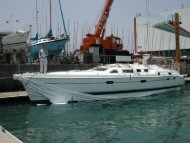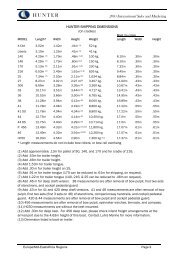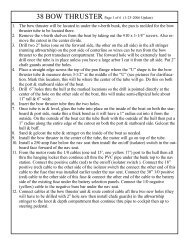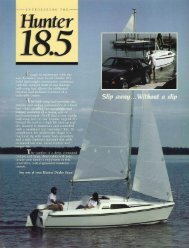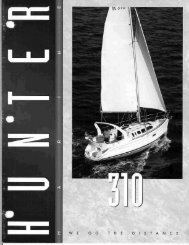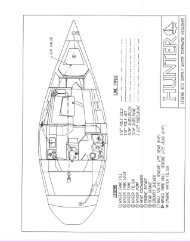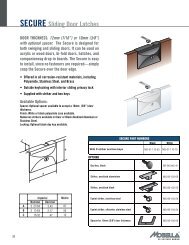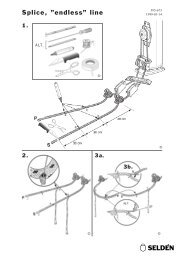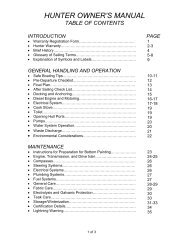27 Operator's Manual.. - Marlow-Hunter, LLC
27 Operator's Manual.. - Marlow-Hunter, LLC
27 Operator's Manual.. - Marlow-Hunter, LLC
Create successful ePaper yourself
Turn your PDF publications into a flip-book with our unique Google optimized e-Paper software.
<strong>Hunter</strong> <strong>27</strong> • Boating Safety<br />
4.3.3 Remember these guidelines:<br />
• Unless your boat is well equipped with charts, head<br />
for shore at the first sign of fog and wait until conditions<br />
improve. If you have charts on board, take bearings as<br />
fog sets in, mark your position, and continue to log your<br />
course and speed.<br />
• Make sure all persons on board are wearing their personal<br />
flotation devices (PFDs). If your boat has sounding<br />
equipment, take soundings regularly and match<br />
them with known depths on your charts.<br />
• Station a person forward in the boat as a lookout.<br />
• Reduce your speed. From time to time, stop engines<br />
and listen for other fog signals.<br />
• Sound the horn or bell at approximately 2 minute<br />
intervals.<br />
• If there is any doubt about continuing your excursion,<br />
anchor. Listen for other fog signals while continuing to<br />
sound your fog horn.<br />
4.3.4 Drugs and Alcohol<br />
Drugs and alcohol affect a person’s ability to make sound<br />
judgments and react quickly. As a responsible boater, you<br />
will refrain from using drugs or alcohol (singly or combined)<br />
while operating your boat. Operation of motorized<br />
vessels while under the influence carries a significant<br />
penalty. Drugs and alcohol decrease your reaction time,<br />
impair your judgment, and inhibit your ability to safely<br />
operate your boat.<br />
4.3.5 Collision<br />
If a serious collision occurs, first check the persons on<br />
board for injuries. Then inspect the boat to determine the<br />
extent of the damage.<br />
Prepare to help the other craft unless your boat or its passengers<br />
are in danger.<br />
Prepare to help the other craft if your bow penetrated the<br />
other boat or its passengers are in danger.<br />
If the bow of the other boat penetrated your boat’s hull,<br />
prepare to plug the fracture once the boats are separate.<br />
4.3.6 Running Aground<br />
If your boat runs aground, check everyone for injury<br />
and inspect damage to the boat or propellers. If lightly<br />
grounded, shift weight of passengers or gear to heel the<br />
boat while reversing engines. If towing becomes necessary,<br />
we recommend using a commercial towing service.<br />
4.3.7 Swamped or Capsized Boat<br />
If your boat becomes swamped or capsized, put on a<br />
PFD immediately and set off a distress signal. Chances<br />
are good a capsized boat will stay afloat. For this reason,<br />
stay with the boat. Do not leave the boat or try to swim<br />
to shore except under extreme conditions. A capsized<br />
boat is easier to see than a swimmer, and shore may be<br />
further away than it appears.<br />
4.3.8 Falling Overboard<br />
One of the most frightening emergencies that can occur<br />
aboard a boat is a crew member or yourself falling overboard.<br />
Although “man overboard” or “MOB” drills have<br />
been a part of boating safety for decades, they have been<br />
largely overlooked by many responsible boat owners.<br />
Just as important as acquiring the knowledge to rescue a<br />
person is the ability to help yourself if you are the person<br />
overboard. Be sure and refer to your “Chapman Piloting”,<br />
“Seamanship and Boat Handling” manual supplied with<br />
your new boat. It is packed with useful and essential<br />
safety and emergency procedures to ensure you have a<br />
safe and happy boating experience.<br />
We have the utmost interest in your safety. Therefore, we<br />
have provided a means of re-boarding the boat should<br />
you or a crew member fall overboard. On the transom,<br />
we have added steps to aid you in re-boarding. If your<br />
boat is equipped with a swim platform, there is a ladder<br />
attached to the platform which extends into the water.<br />
4.3.9 Hypothermia<br />
If a person falls overboard, hypothermia may be an<br />
immediate concern. Hypothermia means a person’s body<br />
loses heat to the water faster than the body can replace<br />
it. If not rescued, the person will become exhausted and<br />
likely drown. In general, the colder the water, the shorter<br />
the time for survival. PFDs will increase survival time<br />
because they provide insulation.<br />
4.11


